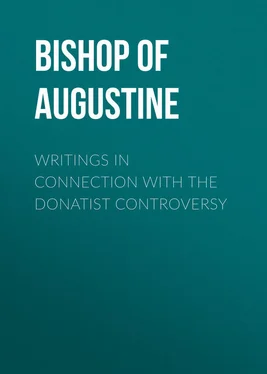Saint Augustine - Writings in Connection with the Donatist Controversy
Здесь есть возможность читать онлайн «Saint Augustine - Writings in Connection with the Donatist Controversy» — ознакомительный отрывок электронной книги совершенно бесплатно, а после прочтения отрывка купить полную версию. В некоторых случаях можно слушать аудио, скачать через торрент в формате fb2 и присутствует краткое содержание. Жанр: foreign_antique, foreign_prose, на английском языке. Описание произведения, (предисловие) а так же отзывы посетителей доступны на портале библиотеки ЛибКат.
- Название:Writings in Connection with the Donatist Controversy
- Автор:
- Жанр:
- Год:неизвестен
- ISBN:нет данных
- Рейтинг книги:3 / 5. Голосов: 1
-
Избранное:Добавить в избранное
- Отзывы:
-
Ваша оценка:
- 60
- 1
- 2
- 3
- 4
- 5
Writings in Connection with the Donatist Controversy: краткое содержание, описание и аннотация
Предлагаем к чтению аннотацию, описание, краткое содержание или предисловие (зависит от того, что написал сам автор книги «Writings in Connection with the Donatist Controversy»). Если вы не нашли необходимую информацию о книге — напишите в комментариях, мы постараемся отыскать её.
Writings in Connection with the Donatist Controversy — читать онлайн ознакомительный отрывок
Ниже представлен текст книги, разбитый по страницам. Система сохранения места последней прочитанной страницы, позволяет с удобством читать онлайн бесплатно книгу «Writings in Connection with the Donatist Controversy», без необходимости каждый раз заново искать на чём Вы остановились. Поставьте закладку, и сможете в любой момент перейти на страницу, на которой закончили чтение.
Интервал:
Закладка:
Chap. xii. – 17. But the blessed Cyprian shows that it was no new or sudden thing that he decided, because the practice had already begun under Agrippinus. "Many years," he says, "and much time has passed away since, under Agrippinus of honoured memory, a large assembly of bishops determined this point." Accordingly, under Agrippinus, at any rate, the thing was new. But I cannot understand what Cyprian means by saying, "And thenceforward to the present day, so many thousand heretics in our provinces, having been converted to our Church, showed no hesitation or dislike, but rather with full consent of reason and will, have embraced the opportunity of the grace of the laver of life and the baptism unto salvation," 130 130 Cypr. Ep. lxxiii. sec. 3.
unless indeed he says, "thenceforward to the present day," because from the time when they were baptized in the Church, in accordance with the Council of Agrippinus, no question of excommunication had arisen in the case of any of the rebaptized. Yet if the custom of baptizing those who came over from heretics remained in force from the time of Agrippinus to that of Cyprian, why should new Councils have been held by Cyprian on this point? Why does he say to this same Jubaianus that he is not doing anything new or sudden, but only what had been established by Agrippinus? For why should Jubaianus be disturbed by the question of novelty, so as to require to be satisfied by the authority of Agrippinus, if this was the continuous practice of the Church from Agrippinus till Cyprian? Why, lastly, did so many of his colleagues urge that reason and truth must be preferred to custom, instead of saying that those who wished to act otherwise were acting contrary to truth and custom alike?
Chap. xiii. – 18. But as regards the remission of sins, whether it is granted through baptism at the hands of the heretics, I have already expressed my opinion on this point in a former book, 131 131 Above, Book i. c. xi. foll.
but I will shortly recapitulate it here. If remission of sins is there conferred by the sacredness of baptism, the sins return again through obstinate perseverance in heresy or schism; and therefore such men must needs return to the peace of the Catholic Church, that they may cease to be heretics and schismatics, and deserve that those sins which had returned on them should be cleansed away by love working in the bond of unity. But if, although among heretics and schismatics it be still the same baptism of Christ, it yet cannot work remission of sins owing to this same foulness of discord and wickedness of dissent, then the same baptism begins to be of avail for the remission of sins when they come to the peace of the Church, – [not] 132 132 Non ut jam vere dimissa non retineantur. One of the negatives here appears to be superfluous, and the former is omitted in Amerbach's edition, and in many of the MSS., which continue the sentence, "non ut ille baptismus," instead of "neque ut ille," etc. If the latter negative were omitted, the sense would be improved, and "neque" would appropriately remain.
that what has been already truly remitted should not be retained; nor that heretical baptism should be repudiated as belonging to a different religion, or as being different from our own, so that a second baptism should be administered; but that the very same baptism, which was working death by reason of discord outside the Church, may work salvation by reason of the peace within. It was, in fact, the same savour of which the apostle says, "We are a sweet savour of Christ in every place;" and yet, says he, "both in them that are saved, and in them that perish. To the one we are the savour of life unto life; and to the other the savour of death unto death." 133 133 2 Cor. ii. 15, 16.
And although he used these words with reference to another subject, I have applied them to this, that men may understand that what is good may not only work life to those who use it aright, but also death to those who use it wrong.
Chap. xiv. – 19. Nor is it material, when we are considering the question of the genuineness and holiness of the sacrament, "what the recipient of the sacrament believes, and with what, faith he is imbued." It is of the very highest consequence as regards the entrance into salvation, but is wholly immaterial as regards the question of the sacrament. For it is quite possible that a man may be possessed of the genuine sacrament and a corrupted faith, as it is possible that he may hold the words of the creed in their integrity, and yet entertain an erroneous belief about the Trinity, or the resurrection, or any other point. For it is no slight matter, even within the Catholic Church, to hold faith entirely consistent with the truth about even God Himself, to say nothing of any of His creatures. Is it then to be maintained, that if any one who has been baptized within the Catholic Church itself should afterwards, in the course of reading, or by listening to instruction, or by quiet argument, find out, through God's own revelation, that he had before believed otherwise than he ought, it is requisite that he should therefore be baptized afresh? But what carnal and natural man is there who does not stray through the vain conceits 134 134 Phantasmata.
of his own heart, and picture God's nature to himself to be such as he has imagined out of his carnal sense, and differ from the true conception of God as far as vanity from truth? Most truly, indeed, speaks the apostle, filled with the light of truth: "The natural man," says he, "receiveth not the things of the Spirit of God." 135 135 1 Cor. ii. 14.
And yet herein he was speaking of men whom he himself shows to have been baptized. For he says to them, "Was Paul crucified for you? or were ye baptized in the name of Paul?" 136 136 1 Cor. i. 13.
These men had therefore the sacrament of baptism; and yet, inasmuch as their wisdom was of the flesh, what could they believe about God otherwise than according to the perception of their flesh, according to which "the natural man receiveth not the things of the Spirit of God?" To such he says: "I could not speak unto you as unto spiritual, but as unto carnal, even as unto babes in Christ. I have fed you with milk, and not with meat: for hitherto ye were not able to bear it, neither yet now are ye able. For ye are yet carnal." 137 137 1 Cor. iii. 1-3.
For such are carried about with every wind of doctrine, of which kind he says, "That we be no more children, tossed to and fro, and carried about with every wind of doctrine." 138 138 Eph. iv. 14.
Is it then true that, if these men shall have advanced even to the spiritual age of the inner man, and in the integrity of understanding shall have learned how far different from the requirements of the truth has been the belief which they have been led by the fallacious character of their conceits to entertain of God, they are therefore to be baptized again? For, on this principle, it would be possible for a Catholic catechumen to light upon the writings of some heretic, and, not having the knowledge requisite for discerning truth from error, he might entertain some belief contrary to the Catholic faith, yet not condemned by the words of the creed, just as, under colour of the same words, innumerable heretical errors have sprung up. Supposing, then, that the catechumen was under the impression that he was studying the work of some great and learned Catholic, and was baptized with that belief in the Catholic Church, and by subsequent research should discover what he ought to believe, so that, embracing the Catholic faith, he should reject his former error, ought he, on confessing this, to be baptized again? Or supposing that, before learning and confessing this for himself, he should be found to entertain such an opinion, and should be taught what he ought to reject and what he should believe, and it were to become clear that he had held this false belief when he was baptized, ought he therefore to be baptized again? Why should we maintain the contrary? Because the sanctity of the sacrament, consecrated in the words of the gospel, remains upon him in its integrity, just as he received it from the hands of the minister, although he, being firmly rooted in the vanity of his carnal mind, entertained a belief other than was right at the time when he was baptized. Wherefore it is manifest that it is possible that, with defective faith, the sacrament of baptism may yet remain without defect in any man; and therefore all that is said about the diversity of the several heretics is beside the question. For in each person that is to be corrected which is found to be amiss by the man who undertakes his correction. That is to be made whole which is unsound; that is to be given which is wanting, and, above all, the peace of Christian charity, without which the rest is profitless. Yet, as the rest is there, we must not administer it as though it were wanting, only take care that its possession be to the profit, not the hurt of him who has it, through the very bond of peace and excellence of charity.
Интервал:
Закладка:
Похожие книги на «Writings in Connection with the Donatist Controversy»
Представляем Вашему вниманию похожие книги на «Writings in Connection with the Donatist Controversy» списком для выбора. Мы отобрали схожую по названию и смыслу литературу в надежде предоставить читателям больше вариантов отыскать новые, интересные, ещё непрочитанные произведения.
Обсуждение, отзывы о книге «Writings in Connection with the Donatist Controversy» и просто собственные мнения читателей. Оставьте ваши комментарии, напишите, что Вы думаете о произведении, его смысле или главных героях. Укажите что конкретно понравилось, а что нет, и почему Вы так считаете.












